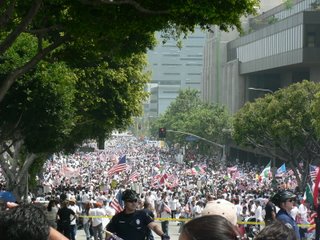CHILE, VENEZUELA AND U.S. BULLYING

Some really shameful behavior here. A perfect example of how we treat one of our best friends in the region when they threaten to get too far out of line. Cold brute power politics that could not be more stupid even from the hard-liners point of view.
Leak Reveals U.S. Arm Twisting To Thwart Venezuela’s Security Council Aspirations Analysis by Justin Vogler
Santiago Times
(May 30, 2006) In a meeting in Washington, April 21, the U.S. secretary of state, Condoleezza Rice, told her Chilean counterpart, Alejandro Foxley, that Washington would “simply not understand” if Chile were to support Venezuela’s bid to become a non-permanent member of the United Nation’s Security Council.
The American deputy secretary of state Robert Zoellick was more emphatic. He told Foxely that Chilean support for Venezuela would “decisively damage” bilateral relations between Chile and the U.S. Furthermore, Chile would be denied the status of “major non-NATO ally of the U.S.” and the cost in terms of the commercial exchange between Chile and the U.S. would be “extremely high.”
Details of the April 21 meeting – obtained from an undisclosed source in the Chilean foreign ministry – were revealed in an article in the May 28 edition of the Chilean daily La Tercera. La Tercera is Chile’s second biggest newspaper and is believed to have good contracts within the government. The article was written by Ascanio Cavallo, Dean of the Adolfo Ibañez University’s School of Journalism.
Chile’s president, Michelle Bachelet, will visit Washington on June 8 when she is scheduled to hold a working lunch with George Bush. According to Cavallo, Venezuela’s Security Council application will dominate the agenda. Indeed, Cavallo says that Foxley was surprised during his meetings with American officials to find them fixated with the Venezuelan issue to the exclusion of all else.
The U.S. is alarmed by recent signs of rapprochement between Michelle Bachelet and her Venezuelan counterpart, Hugo Chávez. Bachelet recently called on the international community not to “demonize” Chávez. Both leaders went out of their way to joke and embrace before cameras at the LAC-EU summit in Vienna earlier this month (ST, May 15). Prior to the summit they held a two hour bilateral meeting to discuss ways of improving ties between Chile and Venezuela.
Sunday’s article provoked reactions from across the political spectrum in Chile. “In international affairs you don’t use these kinds of threats; I find it strange that a U.S. secretary of state would say something like that,” said senate president Sergio Romeo, member of the rightwing National Renovation party (RN).
Jorge Tarud, president of the foreign relations committee of the chamber of deputies, and a deputy for the centre-left Party for Democracy (PPD), was more cautious. “If Rice asked for support for a given candidate, that’s fine, she has that right. But Chile also has the right not to respond.”
Tarud went on to say that UN votes should be conducted secretly “to protect small nations from the pressures that the great powers exert.”
Presidential spokesman Ricardo Lagos Weber (son of former president, Ricardo Lagos) said: “Chile is an honourable country that will not submit to pressure. It is a country that works through diplomacy … we are not here to be pressured, we are here to build consensus.”
Santiago has already had two major diplomatic run-ins with the Bush administration. Chile held one of the pivotal votes in the UN Security Council in 2003 prior to the invasion of Iraq. Despite intense pressure from Washington, the then Chilean president, Ricardo Lagos, refused to support a resolution authorising the invasion.
On that occasion, Robert Zoellick intervened on Chile’s behalf to ensure that the White House didn’t punish Santiago by tearing up the free trade treaty the two countries were poised to sign. Cavallo quotes Zoellick as saying to Foxely that “this time (concerning support for Venezuela) I will not do the same”.
Last year, Santiago was again at loggerheads with Washington over the nomination of the Chilean socialist Jose Miguel Insulza to the presidency of the Organisation of American States. The Venezuelan government was instrumental in securing Insulza’s eventual victory over the U.S.-backed candidate, the former Mexican foreign minister Luis Ernesto Derbez.
...
With the major South America states – Brazil and Argentina – expected to support Venezuela, Chile’s backing could sway the balance decisively in Caracas’ favour.
This episode is part of on-going attempts by the US state department to drive a wedge between what it regards as the “responsible progressive” South American left in Chile and Brazil, and the “irresponsible populist” left in Venezuela, Bolivia and Argentina.
Bachelet and South America’s other leaders have repeatedly stated their commitment to regional unity and seem determined to scupper Washington’s efforts to divide them.



















